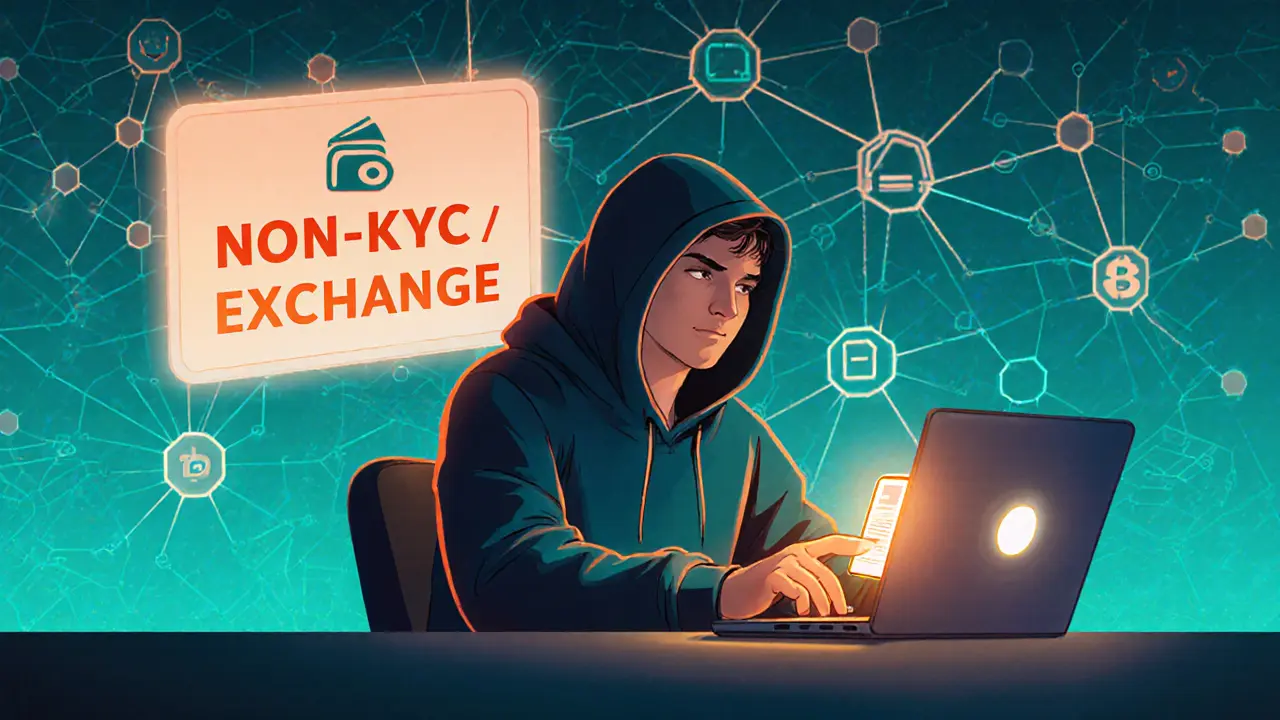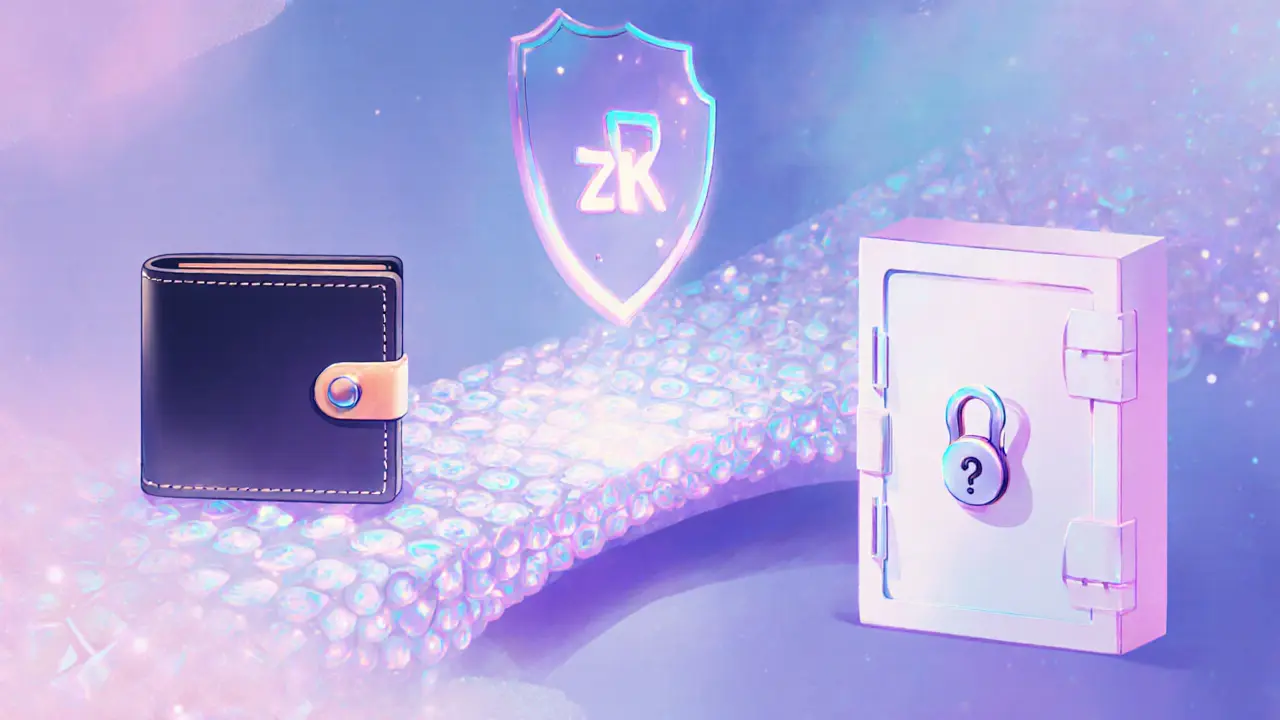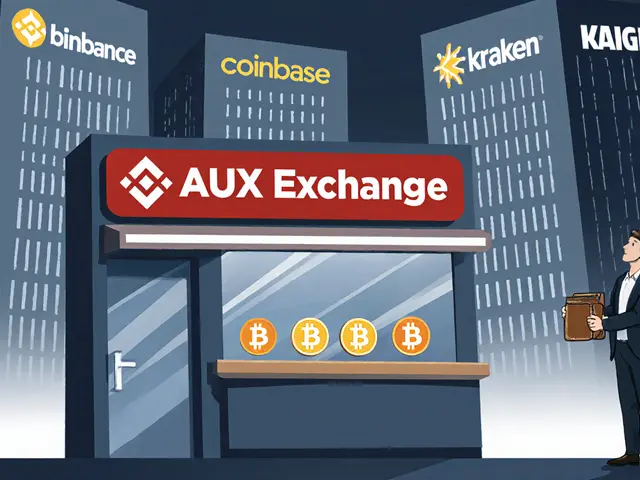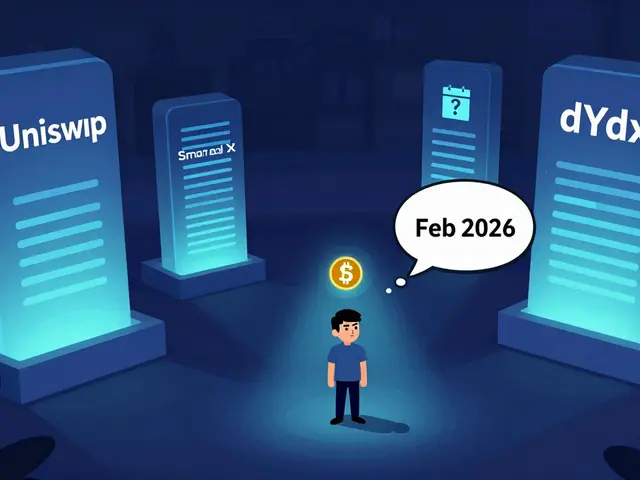Non-KYC Crypto Exchanges: Privacy, Risks, and How to Trade in 2025

Non-KYC Crypto Exchange Comparison Tool
Decentralized Exchange (DEX)
- No identity verification required
- Users retain control of private keys
- Trades occur directly on the blockchain
- Higher security risk due to smart contract vulnerabilities
- Typically uses liquidity pools and AMMs
Non-KYC Centralized Exchange (CEX)
- Limited verification requirements
- Exchange holds user funds
- Instant trading experience
- Lower security risk compared to DEX
- Often includes withdrawal limits
Platform Risk Assessment
Select your primary concern to see recommended approaches:
Recommended Strategy:
Platform Suggestions:
Quick Start Guide
Essential Steps Before Trading:
- Secure a hardware wallet for fund storage
- Choose a reputable platform based on your needs
- Connect your wallet properly
- Check gas fees before executing trades
- Test with small amounts first
- Set withdrawal limits appropriately
Want to trade crypto without handing over a passport or utility bill? That’s the promise of non-kyc crypto exchanges. They let you jump straight into buying, swapping, or selling digital assets, but the shortcut comes with its own set of trade‑offs. Below you’ll learn what these platforms are, which ones still operate without identity checks, why privacy‑first traders love them, and which pitfalls you should watch out for before you click ‘confirm’. By the end you’ll have a clear, step‑by‑step game plan for safe, anonymous trading in October2025.
Key Takeaways
- Non‑KYC exchanges fall into two camps: decentralized exchanges (DEXs) and limited‑function centralised accounts.
- Privacy is the main upside, but security, liquidity and fiat‑out‑flow remain major challenges.
- Regulators worldwide are tightening rules; only a handful of platforms remain truly KYC‑free.
- Start with a hardware wallet, use a reputable DEX, and keep withdrawal limits in mind.
- Future trends point toward hybrid models that blend anonymity with selective compliance.
What Are Non‑KYC Crypto Exchanges?
Non-KYC Crypto Exchanges are platforms that allow users to trade cryptocurrencies without submitting personal identification documents such as passports, driver’s licenses, or proof‑of‑address. They emerged as a response to growing demand for privacy and frictionless onboarding. Instead of a multi‑step verification, you can sign up with an email or even just a wallet address and start swapping assets immediately.
Two Main Types: DEX vs. Non‑KYC Centralised Accounts
Not all “no‑KYC” services work the same way. Broadly they split into two categories.
Decentralized Exchange (DEX) is a peer‑to‑peer trading protocol that runs on smart contracts, requiring no central authority to hold user funds or verify identities. Trades happen on‑chain, and users keep custody of their tokens throughout the process.
Centralized Exchange (CEX) - Non‑KYC Account is a traditional crypto exchange that permits a limited range of actions (usually small withdrawals) without demanding identity documents. The platform still controls the order book and holds users’ balances, but it relaxes KYC thresholds for low‑volume accounts.
| Feature | DEX | Non‑KYC CEX |
|---|---|---|
| Custody | User retains private keys | Exchange holds funds |
| Liquidity source | Liquidity pools & AMMs | Central order book |
| KYC requirement | None | Limited - often daily withdrawal caps |
| Speed of trade | On‑chain confirmation (depends on gas) | Instant matching |
| Security model | Smart‑contract risk | Exchange security & custodial risk |
| Regulatory exposure | Indirect - depends on token contracts | Direct - exchange can be targeted by regulators |

Leading Non‑KYC Platforms in 2025
Even after several rounds of regulatory crackdowns, a few platforms still let you trade without uploading a scan of your ID.
- Uniswap is the flagship Ethereum‑based DEX that lets anyone swap ERC‑20 tokens via its automated market maker. No account needed; just connect your wallet.
- SushiSwap is a multi‑chain DEX offering a similar AMM model to Uniswap, with added yield‑farm options. Works with Ethereum, BSC, Polygon, and more.
- MEXC is a centralized exchange that still permits unverified users to trade and withdraw up to 0.5BTC per day. Requires email registration only.
- Best Wallet is a hybrid platform providing a non‑KYC spot market alongside a built‑in wallet interface. Popular for quick swaps.
- BingX is a CEX that allows up to 2BTC daily withdrawals without full KYC, targeting the Asian market.
Note that giants like KuCoin and OKX have recently introduced mandatory KYC for most users, so the list above reflects the most reliable KYC‑free options as of October2025.
Why Traders Choose No‑KYC Exchanges
- Privacy protection - No personal data is stored on the platform, reducing exposure to data breaches.
- Instant onboarding - Skip hours (or days) of document verification and start trading right away.
- Global accessibility - Users in restricted jurisdictions can still access liquidity.
- Control over funds - Especially on DEXs, you keep the private keys, meaning no custodial lock‑in.
- Composability - Seamlessly chain swaps, bridges, and stablecoin conversions in a single transaction flow.
Risks and Limitations You Can’t Ignore
- Security gaps - Non‑KYC platforms often lack robust customer support; smart‑contract bugs can lead to loss of funds.
- Liquidity challenges - Smaller pools mean higher slippage, especially for obscure token pairs.
- Fiat conversion bottleneck - Even if you swap to a stablecoin on a DEX, you still need a KYC‑enabled gateway or bank to cash out.
- Regulatory pressure - Exchanges can be forced to shut down or add KYC with little notice, risking frozen assets.
- Gas and bridging fees - On‑chain swaps incur network fees that can dwarf small trade amounts.

Regulatory Landscape in 2025
Financial Action Task Force (FATF) is an intergovernmental body that sets standards for anti‑money‑laundering (AML) and counter‑terrorism financing worldwide. Its guidance defines Virtual Asset Service Provider (VASP) as any business that conducts virtual‑asset transactions, including exchanges between crypto and fiat. Many jurisdictions now treat any platform facilitating crypto swaps - even decentralized ones - as a VASP, which obliges them to collect KYC data.
In the United States, the Treasury’s FinCEN has increased scrutiny on OTC desks and hybrid exchanges, forcing most to adopt mandatory verification. The European Union’s AMLD6 directive treats crypto‑asset service providers the same as traditional financial institutions, meaning EU‑based DEX aggregators may have to embed KYC modules.
These regulatory moves have shrunk the pool of truly anonymous exchanges, but niche platforms continue to operate in jurisdictions with looser enforcement, often by using decentralized smart‑contract architectures that technically evade direct classification as VASPs.
How to Get Started Safely on a Non‑KYC Exchange
- Secure a hardware wallet. Store your private keys offline; this protects you if a platform gets hacked.
- Choose the right platform. For pure on‑chain swaps, start with Uniswap or SushiSwap. For quick fiat‑to‑crypto entry, MEXC or Best Wallet are the most reliable KYC‑free options.
- Connect your wallet. Use the “Connect” button, approve the blockchain network, and verify the contract address matches the official site.
- Check gas fees. On Ethereum, fees can spike to $20+ during congestion; consider layer‑2 solutions like Arbitrum or Polygon for cheaper trades.
- Perform a test swap. Trade a tiny amount (e.g., $10 worth) to ensure the transaction flow works as expected.
- Set withdrawal limits. Most non‑KYC accounts cap daily withdrawals; plan your exit strategy accordingly.
- Use reputable bridges. When moving assets across chains, pick audited bridges (e.g., Wormhole, Hop) to avoid cross‑chain exploits.
- Keep records. Even without KYC, maintaining a transaction log helps with tax reporting and dispute resolution.
What the Future Holds for Anonymous Trading
Analysts agree that the pure‑anonymity model faces mounting pressure. However, two trends are shaping the next wave:
- Hybrid DEX‑CEX architectures. Platforms like dYdX and PancakeSwap are adding optional KYC layers for large withdrawals while keeping the core trading engine permission‑less.
- Zero‑knowledge proof integrations. zk‑Rollups and zk‑SNARKs allow users to prove compliance without revealing identities, offering a potential compromise between regulators and privacy advocates.
Until such solutions become mainstream, the safest approach remains a diversified strategy: use DEXs for privacy‑critical swaps, keep a small stash on a non‑KYC CEX for quick fiat exits, and always keep the bulk of your holdings in a self‑custodied wallet.
Frequently Asked Questions
Can I withdraw fiat from a non‑KYC exchange?
Direct fiat withdrawals are virtually impossible on truly KYC‑free platforms. Most users first swap to a stablecoin on a DEX, then move the stablecoin to a KYC‑enabled gateway or bank account to cash out.
Are non‑KYC exchanges illegal?
Legality varies by jurisdiction. In many countries, operating a crypto exchange without AML/KYC compliance can attract regulatory penalties, but using such platforms for personal trades is often not a criminal act unless tied to illicit activity.
What’s the biggest security risk on a DEX?
Smart‑contract bugs or malicious rug pulls. Because the code is open‑source, vulnerabilities can be exploited before the community patches them. Always use audited contracts and limit exposure.
Do non‑KYC platforms charge higher fees?
Fees depend on the underlying blockchain, not the KYC policy. However, low‑liquidity pools can cause higher slippage, effectively raising costs for traders.
How can I stay compliant with taxes?
Maintain a detailed spreadsheet of every swap, including transaction hash, date, amount, and market value in USD. Most tax software now accepts crypto CSV imports, making reporting easier.



Debra Sears
If you’re just getting started, the most important thing is to protect your private keys. A hardware wallet is the gold standard because it isolates your seed phrase from any internet‑connected device. When you pick a non‑KYC platform, double‑check the contract address on an official source; phishing sites are rampant. Keep a small test transaction on the side so you can verify the gas fees and slippage before committing larger sums. Finally, write down every swap in a spreadsheet; it will save you headaches when tax time rolls around. Staying disciplined now pays dividends in both security and peace of mind.
Matthew Laird
Trading on a platform that refuses to verify anyone is a reckless gamble that fuels money‑laundering and criminal activity. The United States has a responsibility to enforce AML rules, and users who skirt them are complicit. If you care about the integrity of our financial system, stick to exchanges that demand proper identification. Anything less is a betrayal of the rule of law. Patriotism means supporting institutions that protect the nation, not undermining them for a cheap thrill.
Richard Bocchinfuso
I gotta say, using a no‑ID exchange woudnt be a good idea if you care about your money. Lots of these sites are just a front for scams that definetly steal your coins. Make sure you read the audit reports and don't just trust a slick UI. A little due diligence now will save you a ton of trouble later.
Andrew Lin
Everyone thinks they know crypto, but most don't understand the real risk of unregulated markets. As an American, we have the best tech and security standards, so there's no excuse to hide behind shady foreign DEXs. The only smart move is to use regulated platforms that keep the economy strong. Anything else is just a reckless stunt for short‑term gains.
Caitlin Eliason
The allure of anonymity is a siren song that leads honest people into a nightmare of fraud. When you bypass KYC, you’re essentially handing the door open for scammers and terrorists. It’s not just about personal freedom; it’s about protecting the community from vile actors. Choose platforms that balance privacy with responsibility, or you’ll be complicit in the chaos. Remember, true liberty comes with accountability.
Ken Pritchard
Let’s break this down step by step so you don’t feel overwhelmed. First, grab a reputable hardware wallet-Ledger or Trezor are solid choices. Next, pick a DEX like Uniswap for truly permission‑less swaps, but always verify the token contract on the official site. If you need fiat on‑ramp, consider a regulated exchange that offers a limited‑KYC tier for small amounts. Lastly, keep a detailed log of every transaction; it’s a habit that will pay off when tax season arrives. Feel free to ask for clarification on any of these steps.
Mark Fewster
When evaluating a non‑KYC service, look at three key factors: security audits, community reputation, and liquidity depth. A platform that lacks a recent audit, or has a history of exploits, should be avoided. Always test with a minimal amount, observe the slippage, and then decide whether to scale up. Remember, a cautious approach reduces risk.
Patrick Gullion
You might think non‑KYC exchanges are dead‑ends, but they actually fill a niche that big CEXs ignore. For privacy‑focused traders, they’re the only viable option to avoid data mining. Sure, there are risks, but with proper wallet hygiene the payoff can be worth it. It’s all about balancing convenience with caution. Keep an eye on emerging zk‑rollup solutions-they could change the game.
Nicholas Kulick
Smart‑contract audits are essential; always check that the DEX you use has been reviewed by reputable firms like ConsenSys or OpenZeppelin.
Jason Wuchenich
You're doing great by taking the time to understand the mechanics before diving in. Start with a tiny trade on a DEX, watch the gas fees, and note how long the transaction confirms. As you build confidence, you can increase the amount gradually. Keep a positive mindset-you’ve got this!
Kate O'Brien
I’m pretty sure the big banks are pushing these KYC rules to keep us under their thumb. They want every transaction traced so they can control the flow of money. Non‑KYC platforms are a way to fight back, but they’re being hunted down one by one.
Ricky Xibey
Never trust a link that isn’t https.
Moses Yeo
Consider the paradox: freedom thrives when we surrender a fragment of it to regulation; yet too much surrender suffocates liberty. The non‑KYC exchange is a mirror reflecting our desire for privacy, but also our fear of oversight. It is not merely a tool, but a statement of dissent against centralized power. In the grand tapestry of finance, each anonymous trade weaves a strand of rebellion. Therefore, the choice to engage is both personal and political.
Anna Engel
Oh, sure, because the world really needs more anonymous bots swapping shitcoins in the dark. I’m sure regulators will just roll their eyes and let the chaos continue. If you’re looking for financial enlightenment, maybe try a textbook instead of a back‑alley DEX. The market thanks you for your contribution to ‘innovation.’
Marcus Henderson
It is incumbent upon the discerning investor to reconcile the competing imperatives of privacy and regulatory compliance. While non‑KYC platforms proffer an alluring veil of anonymity, they simultaneously engender exposure to unchecked contractual vulnerabilities. A judicious approach entails the utilization of decentralized venues for low‑risk swaps, complemented by custodial services for substantial holdings. Moreover, adherence to prevailing tax obligations remains paramount, irrespective of anonymity. In sum, equilibrium between discretion and due diligence constitutes the hallmark of sound stewardship.
Don Price
The silence surrounding non‑KYC exchanges is not an accident, it is the product of a coordinated effort by global financial powers to erase the last bastions of monetary privacy. Every time a new DEX appears, the shadowy consortium of central banks, intelligence agencies, and corporate lobbyists convene to devise a fresh set of regulations aimed at smothering it. They cloak their intentions in the language of anti‑money‑laundering, but the true motive is to retain unfettered visibility into every digital transaction. Through sophisticated surveillance tools they can trace blockchain activity back to wallet addresses, even when the user believes they are operating under a veil of anonymity. The recent crackdown on privacy‑focused mixers is a case in point, where law‑enforcement agencies leveraged subpoenas to force exchanges to reveal transaction histories. What many fail to realize is that the underlying code of these platforms is open source, and thus can be forked and reborn under a different name as soon as one is shut down. Yet the average user, lured by the promise of privacy, often neglects the importance of auditing the smart contracts themselves. A single unchecked vulnerability can drain an entire liquidity pool, leaving users financially crippled while the developers walk away unscathed. Furthermore, the fiat on‑ramp remains the Achilles’ heel; without a legitimate gateway to cash out, the anonymity of on‑chain swaps is largely moot. Regulators are keenly aware of this and are pressuring payment processors to enforce strict KYC on every gateway, effectively sealing the exit route. Consequently, the only truly private way to convert crypto to cash involves peer‑to‑peer trades that are conducted off‑record, a method that carries its own social and legal risks. In the broader geopolitical landscape, the erosion of financial privacy is a stepping stone toward a surveillance state that monitors not just your purchases but your ideological affiliations. By denying authorities a glimpse into the flow of digital assets, users assert a modest but meaningful degree of autonomy. Hence, the battle is not simply about choosing a platform, but about preserving a fundamental right to financial self‑determination. To navigate this treacherous terrain, one must diversify across multiple chains, regularly update wallet firmware, and maintain an immutable log of all interactions. Only through disciplined vigilance can the individual hope to stay ahead of the ever‑expanding reach of centralized control.
Jasmine Kate
The market dynamics on non‑KYC DEXs are a cocktail of hype and hidden risk that most traders overlook. Liquidity can evaporate in seconds, leaving you with a position you can’t unwind without massive slippage. Pair that with the ever‑looming threat of contract exploits, and you have a recipe for disaster. If you’re not prepared to lose everything, stay away from low‑volume pools. Analytical rigor is your only shield against this chaotic frontier.
Dawn van der Helm
Hey folks! 🌟 Keeping a balanced approach to privacy and compliance can actually make your trading experience smoother. 😊 Remember, a little caution goes a long way, so stay safe and happy swapping! 🚀
Monafo Janssen
Crypto knows no borders, and the desire for privacy is a universal feeling. Whether you’re in New York or Nairobi, the same concerns about data collection apply. Non‑KYC platforms give a glimpse of financial freedom that many cultures cherish. However, every region has its own legal quirks, so always check local regulations before you dive in. Use a hardware wallet to keep your keys safe, and never share your seed phrase. By respecting both the technology and the local customs, you can trade responsibly worldwide.
Michael Phillips
I tend to sit back and observe before jumping into any platform. From what I’ve seen, the most reliable DEXs are those with active community governance and frequent audits. If a project hasn’t posted a recent security report, I treat it with caution. It’s also wise to limit exposure to a small percentage of your portfolio until you’re comfortable. Overall, a measured, collaborative approach helps avoid costly mistakes.
Jason Duke
Don’t let fear hold you back-take that first step with confidence! The crypto world rewards bold moves, especially when you back them with solid research! Remember, every seasoned trader started as a beginner, so keep learning and stay resilient! Success is just a series of smart, calculated choices away!
Franceska Willis
Yo, you gotta check the gas fees before you blast off any trade, otherwise you’ll be paying more than the crypto itself! I once saw a dude lose half his stash ‘cause he ignored the fee popup-total facepalm! Also, never trust a random link that says “instant swap,” that’s a trap. Keep your eyes peeled for fake UI’s that mimic the real thing. Stay sharp, stay rich!
EDWARD SAKTI PUTRA
I understand the temptation to jump straight into a no‑KYC exchange, but taking a moment to set up proper security can save you a lot of trouble. Start by writing down your seed phrase on paper and storing it in a safe place. Test the wallet connection with a tiny amount before moving larger funds. This extra care will protect you and give you confidence.
Bryan Alexander
Embracing the freedom of anonymous trading can feel like stepping onto a new frontier, and that excitement is priceless. With the right safeguards-hardware wallet, contract verification, and modest test trades-you’ll navigate safely. Remember, every great explorer faced unknowns but pressed on with preparation. Your journey into crypto privacy is just beginning, and the horizon looks bright. Stay bold, stay smart, and keep the momentum going!